#capitalism corruption
Explore tagged Tumblr posts
Text
this has got to be my favorite c&h comic of all time. he just turns evil for no reason at all

#196#shitpost#calvin and hobbes#c&h#shitposting#the capital corrupted him#he went evil mode#little gremlin
36K notes
·
View notes
Text

Source
#capitalism#taxes#irs#politics#us politics#government#the left#end capitalism#corporatism#corruption#progressive
23K notes
·
View notes
Text
I hate it here
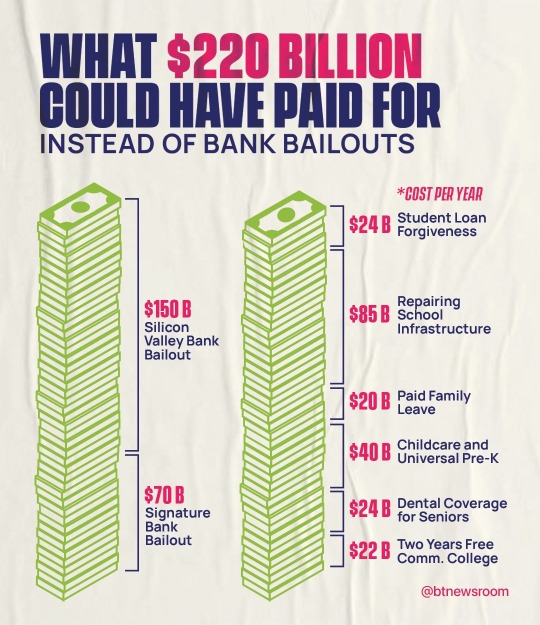
Let this be a lesson against believing politicians lies.
Keeping wealth concentrated in the 1% is the end goal of capitalism.
They will do whatever is necessary to keep the working class desperate and dependent on the system that impoverishes them.
#at what point to wh break out the guillotine#i’m so serious#capitalism#late stage capitalism#silicon valley bank#bank bailout#corruption#corporate corruption#corporate greed#eat the rich#tax the 1%#tax the rich#government bailout
8K notes
·
View notes
Text

youtube
#anti capitalism#neoliberal capitalism#capitalism#george carlin#democracy is a lie#imperialism#ausgov#politas#auspol#tasgov#taspol#australia#fuck neoliberals#anthony albanese#albanese government#eat the rich#eat the fucking rich#class war#government corruption#fbi corruption#biden corruption#corrupt politicians#corrupt police#all cops are bastards#all cops are bad#antifascist#antinazi#antiauthoritarian#anti slavery#antifaschistische aktion
2K notes
·
View notes
Text
Of course we can tax billionaires
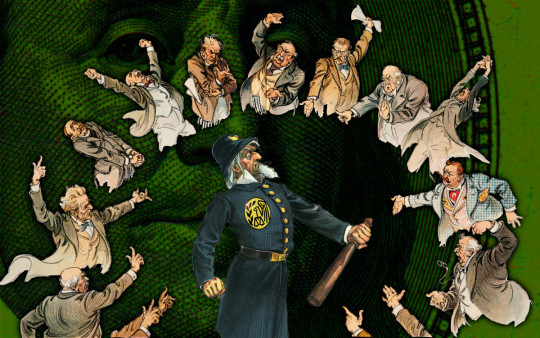
On OCTOBER 23 at 7PM, I'll be in DECATUR, presenting my novel THE BEZZLE at EAGLE EYE BOOKS.

Billionaires are pretty confident that they can't be taxed – not just that they shouldn't be taxed, but rather, that it is technically impossible to tax the ultra-rich. They're not shy about explaining why, either – and neither is their army of lickspittles.
If it's impossible to tax billionaires, then anyone who demands that we tax billionaires is being childish. If taxing billionaires is impossible, then being mad that we're not taxing billionaires is like being mad at gravity.
Boy is this old trick getting old. It was already pretty thin when Margaret Thatcher rolled it out, insisting that "there is no alternative" to her program of letting the rich get richer and the poor go hungry. Dressing up a demand ("stop trying to think of alternatives") as a scientific truth ("there is no alternative") sets up a world where your opponents are Doing Ideology, while you're doing science.
Billionaires basically don't pay tax – that's a big part of how they got to be billionaires:
https://www.propublica.org/series/the-secret-irs-files
By cheating on their taxes, they get to keep – and invest – more money than less-rich people (who get to keep more money than regular people and poor people, obvs). They get so much money that they can "invest" it in corrupting the political process, for example, by flushing vast sums of dark money into elections to unseat politicians who care about finance crime and replace them with crytpo-friendly lawmakers who'll turn a blind eye to billionaires' scams:
https://www.newyorker.com/magazine/2024/10/14/silicon-valley-the-new-lobbying-monster
Once someone gets rich enough, they acquire impunity. They become too big to fail. They become too big to jail. They become too big to care. They buy presidents. They become president.
A decade ago, Thomas Piketty published his landmark Capital in the 21st Century, tracing three centuries of global capital flows and showing how extreme inequality creates political instability, leading to bloody revolutions and world wars that level the playing field by destroying most of the world's capital in an orgy of violence, with massive collateral damage:
https://memex.craphound.com/2014/06/24/thomas-pikettys-capital-in-the-21st-century/
Piketty argued that unless we taxed the rich, we would attain the same political instability that provoked the World Wars, but in a nuclear-tipped world that was poised on the brink of ecological collapse. He even laid out a program for this taxation, one that took accord of all the things rich people would try to hide their assets.
Today, the destruction that Piketty prophesied is on our doorstep, and all over the world, political will is gathering to do something about our billionaire problem. The debate rages from France to dozen-plus US states that are planning wealth taxes on the ultra-rich.
Wherever that debate takes hold, billionaires and their proxies pop up to tell us that we're Doing Ideology, that there is no alternative, and that it is literally impossible to tax the ultra-rich.
In a new blog post, Piketty deftly demolishes this argument, showing how thin the arguments for the impossibility of a billionaire tax really is:
https://www.lemonde.fr/blog/piketty/2024/10/15/how-to-tax-billionaires/
First, there's the argument that the ultra-rich are actually quite poor. Elon Musk and Mark Zuckerberg don't have a lot of money, they have a lot of stock, which they can't sell. Why can't they sell their stock? You'll hear a lot of complicated arguments about illiquidity and the effect on the share-price of a large sell-off, but they all boil down to this: if we make billionaires sell a bunch of their stock, they will be poorer.
No duh.
Piketty has an answer to the liquidity crisis of our poormouthing billionaires:
If finding a buyer is challenging, the government could accept these shares as payment for taxes. If necessary, it could then sell these shares through various methods, such as offering employees to purchase them, which would increase their stake in the company.
Though Piketty doesn't say so, billionaires are not actually poor. They have fucktons of cash, which they acquire through something called "buy, borrow, die," which allows them to create intergenerational dynastic wealth for their failsons:
https://finance.yahoo.com/news/buy-borrow-die-rich-avoid-140004536.html
Billionaires know they're not poor. They even admit it, when they say, "Okay, but the other reason it's impossible to tax us is that we're richer and therefore more powerful than the governments that want to try it."
Piketty points out the shell-game at the core of this argument: the free movement of money that allows for tax-dodging was created by governments. They made these laws, so they can change them. Governments that can't exercise their sovereign power to tax the wealthy end up taxing the poor, eroding their legitimacy and hence their power. Taxing the rich – a wildly popular move – will make governments more powerful, not less.
Big countries like the US (and federations like the EU) have a lot of power. The US ended Swiss banking secrecy and manages to tax Americans living abroad. There's no reason that France couldn't pass a wealth-tax that applies to people based on their historical residency: a 51 year old French billionaire who decamps to Switzerland to duck a wealth tax after 50 years in France could be held liable for 50/51 of the wealth tax.
The final argument Piketty takes up is the old saw that taxing the rich is illegal, or, if it were made legal, would be unconstitutional. As Piketty says, rich people have taken this position every single time they faced meaningful tax enforcement, and they have repeatedly lost this fight. France has repeatedly levied wealth taxes, as long ago as 1789 and as recently as 1945.
Taxing the ultra-rich isn't like the secret of embalming Pharaohs – it's not a lost art from a fallen civilization. The US top rate of tax in 1944 was 97%. The postwar top rate from 1945-63 was 94%, and it was 70% from 1965-80. These was the period of the largest expansion of the US economy in the nation's history. These are the "good old days" Republicans say they want to return to.
The super-rich keep getting richer. In France, the 500 richest families were worth a combined €200b in 2010. Today, it's ���1.2 trillion. No wonder a global wealth tax is at the top of the agenda for next month's G20 Summit in Rio.
Here in the US – where money can easily move across state lines and where multiple states are racing each other to the bottom to be the best onshore-offshore tax- and financial secrecy-haven – state-level millionaire taxes are kicking ass.
Massachusetts's 2024 millionaire tax has raised more than $1.8b, exceeding all expectations (it was originally benchmarked at $1b), by taxing annual income in excess of $1m at an additional 4%:
https://www.boston.com/news/business/2024/05/21/heres-how-much-the-new-massachusetts-millionaires-tax-has-raised-this-year/
This is exactly the kind of tax that billionaires say is impossible. It's so easy to turn ordinary income in sheltered income – realizing it as a capital gain, say – so raising taxes on income will do nothing. Who are you gonna believe, billionaires or the 1.8 billion dead presidents lying around the Massachusetts Department of Revenue?
But say you are worried that taxing ordinary income is a nonstarter because of preferential capital gains treatment. No worry, Washington State has you covered. Its 7% surcharge on capital gains in excess of $250,000 also exceeded all expectations, bringing in $600m more than expected in its first year – a year when the stock market fell by 25%:
https://pluralistic.net/2023/06/03/when-the-tide-goes-out/#passive-income
Okay, but what if all those billionaires flee your state? Good riddance, and don't let the door hit you on the way out. All we need is an exit tax, like the one in California, which levies a one-time 0.4% tax on net worth over $30m for any individual who leaves the state.
Billionaires are why we can't have nice things – a sensible climate policy, workers' rights, a functional Supreme Court and legislatures that answer to the people, rather than deep-pocketed donors.
The source of billionaires' power isn't mysterious: it's their money. Take away the money, take away the power. With more than a dozen states considering wealth taxes, we're finally in a race to the top, to see which state can attack the corrosive power of extreme wealth most aggressively.

Tor Books as just published two new, free LITTLE BROTHER stories: VIGILANT, about creepy surveillance in distance education; and SPILL, about oil pipelines and indigenous landback.


If you'd like an essay-formatted version of this post to read or share, here's a link to it on pluralistic.net, my surveillance-free, ad-free, tracker-free blog:
https://pluralistic.net/2024/10/15/piketty-pilled/#tax-justice
#pluralistic#wealth tax#tax#capital gains tax#soak the rich#eat the rich#guillotine watch#uspoli#thomas piketty#corruption#tax havens#tax competition#tina#there is no alternative
444 notes
·
View notes
Text
I think it was a mistake for s2 of Arcane to gloss over the implications of Amara and the Black Rose's deception in Mel's story because it fundamentally unmoors her perspective. Mel believed that violence like war could be avoided through diplomacy, and she applies that philosophy by maintaining the complex political environment in Piltover where every house is in some way content.

In the face of the nobility's discontent with Jayce's anti-corruption measures, Mel sought to appease them to stave off retaliation. Through her lesson to Jayce, Mell didn't just help potentially enrich her colleagues but also the woman and by extension the organization that KILLED HER BROTHER AND STOLE HER FAMILY'S ASSETS.

Can you imagine the horror and disgust she would feel at having trusted Piltover to be different? Mel thought she understood the game but she wildly underestimated the machinations of the nobility in Piltover. Mel accepted Piltover's corruption as a means to avoid violent conflict, only to indirectly enable the recent violence harped upon her own family. And the worst irony is that even though politics and corruption have largely been viewed as a cynicism game, for Mel this was an avenue she genuinely believed conflict could be avoided but in fact it was just more insidious.
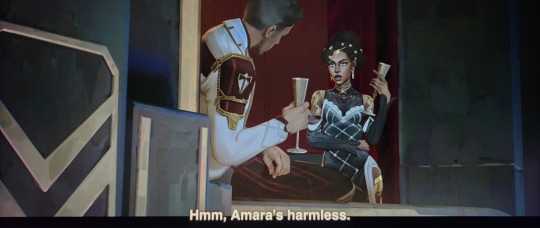
The opera scene was a lesson for Jayce in politics, but the effects should be the real education for Mel as she heads to Noxus. From what I can tell Noxus is in its pre-Trifarix but post-First Invasion of Ionia, which means Swain has his demon powers but he hasn't overthrown the emperor yet. She will probably ally with him as they're both opporpsed to the Black Rose's existence, however once he's in power he will alienate a large portion of the nobility as they root out the Black Rose's influence.

The challenge for Mel (possibly as Guile) is to deal with these disgruntled nobles because as Piltover proved, you can appease them through corruption all you want, but once their ideology is truly set against you, diplomacy becomes a far more complicated balancing act.
#arcane#mel medarda#arcane meta#league of legends#lol#we can talk about how Piltover's political system is predicated on violence til the cows come home#as well as how Mel's traumatic experiences impacted her persoective to see piltover as preferable to noxus#but like i said before it's all more insidious than she understood#and the answer to dealing with corruption or upset nobles can't singularly be appeasement bcuz look how that turned out#obviously accruing political capital to do ANYTHING is complicated but the situation calls for a shrewder eye#it really was a missed opportunity for mel to understand what she's up against and indirectly enabled#bcuz now she's going to noxus and her family is financially worse off and she really doesn't know the SCOPE of things
233 notes
·
View notes
Text
As more Canadians find themselves struggling to afford or find housing, the country's smallest province is the only one that can point to legislation recognizing housing as a human right.
The Canadian Press asked every province whether it agreed with the federal housing advocate that shelter is a human right, and if it intends to introduce legislation upholding that right.
Most did not answer the questions directly and responded with a laundry list of initiatives launched to address the housing crises brewing in their jurisdictions.
In Quebec, the government's lack of interest in addressing the question was revealed in an errant email sent to a reporter.
When prodded for a response one week after an initial request, a spokesperson for Quebec's housing minister mistakenly sent a reply intended for a government colleague.
"Do I ghost her again?" she wrote Thursday. "Otherwise, a general response that doesn't answer, to say housing is a priority for our government?" By Friday afternoon, Quebec had not provided a response. [...]
Continue Reading.
Tagging: @newsfromstolenland, @vague-humanoid
#cdnpoli#housing crisis#neoliberalism#corruption#capitalism#federal vs provincial#absolutely fucking disgusting
638 notes
·
View notes
Text
astarion baldursgate being a nepo baby corrupt magistrate before his death is a deliberate narrative choice meant to highlight that in the tradition of The Vampire being an incredibly transparent metaphor for class dynamics of feudalism (evil lord living in a palace demanding the blood of the peasantry,) the category of the Vampire Spawn exists as a clear analogue to the bourgeoisie and their role in perpetuating the power of the aristocracy. in the rest of this deranged fucking text post i will
#if you are a corrupt DA you are already a vampire spawn. to capital#bg3#hey has anyone noticed that the mindflayers live in a stateless classless soci-i am forcibly shoved into a chasm
899 notes
·
View notes
Text

#hunter s thompson#quote#politics#oligarchy#rat bastard#drumpf#corruption#warmongers#gonzo journalism#america#late stage capitalism#collapse#2025#inauguration#crypto
138 notes
·
View notes
Text








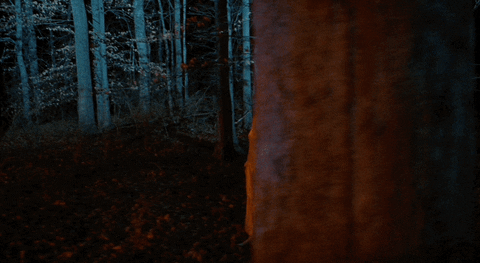

no promise of heaven will make me march with my final breath I deny the church
#seeing a band from the bible belt write a song about growing up in a christian environment#and ultimately distancing yourself from it as you get older and recognize the hypocrisy and corruption within the church#means so much to me#idek where to start w this video#the colors#the grainy film#the southern gothic vibes#one thing about knocked loose is they're gonna make some capital-A Art baby#blinding faith#knocked loose#K//L#you won't go before you're supposed to#hxc
300 notes
·
View notes
Text
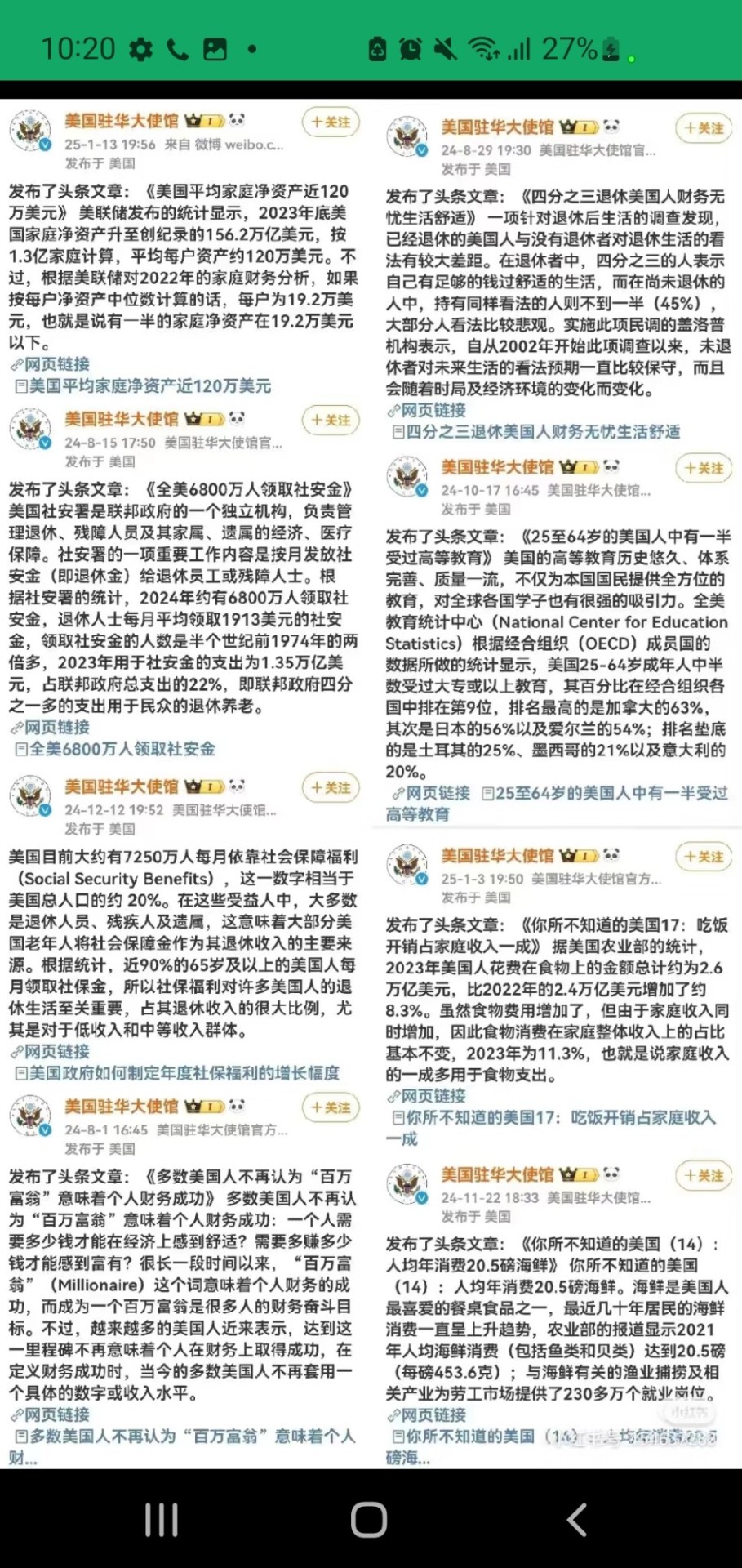
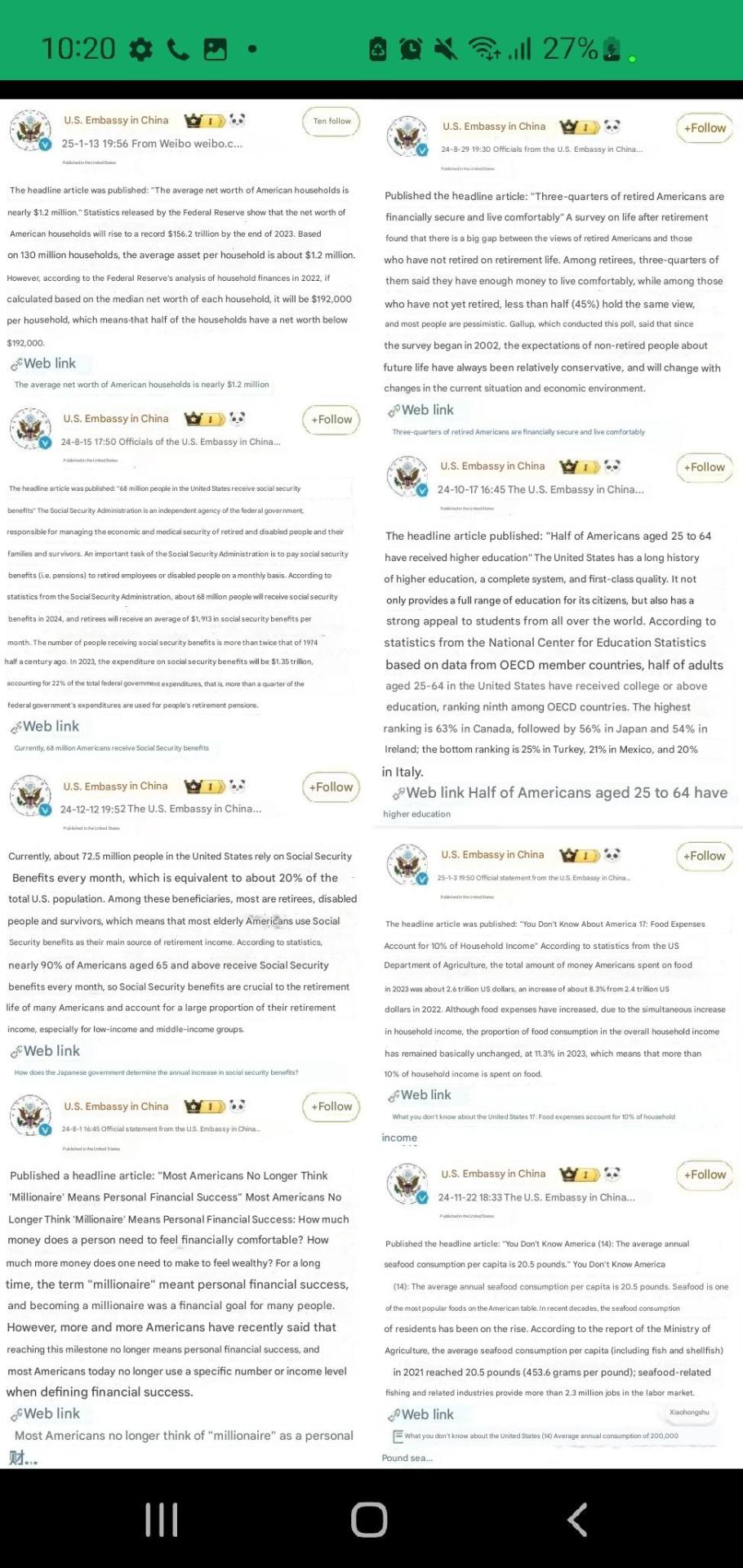
On the left is an official document issued to the Chinese government by the American Embassy, shared on xiaohongshu and apparently believed by normal Chinese folk, that is filled with so many lies it makes me want to rage puke- and I'm not even American. On the right is the translation of this document into English. Here's a little tl;dr-
- According to the American Embassy, the average American household income is $1.2 MILLION. This is clearly a manipulated statistic, but the method of manipulation is interesting- because for this number to make sense as an average, it would mean the wealthiest people in America could make every household millionaires and still be millionaires themselves. I don't doubt that this is, indeed, the mathematical average of American income, which is disgusting considering the income of the average American.
-According to the American Embassy, social security provides adequate healthcare, childcare, social services and pensions to a majority of Americans. They are literally saying you guys get FREE HEALTHCARE. At this point, everybody in the Western world knows this is patently untrue, no matter which way you approach the matter.
-According to the American Embassy, recent surveys have shown that Americans don't even consider 'millionaires' to be rich anymore. I don't even know what to say about this one, I'm lost for words! Every American I know would consider themselves, at the very least, profoundly fortunate if they were a millionaire.
- According to the American Embassy, food costs account for roughly 10% of household income, and a 1.3% rise in the price of groceries recently is in line with recent wage increases and therefore effectively unchanged. Is this your experience of recent increases in the cost of food? Pretty confident the answer is "LMAO no, wtf?!".
Look, I know I'm not American, but I care about several American people personally, and I care about human beings generally. I've spent time in LA and seen the homeless camps. It breaks my fucking heart to know that many of the people in those camps have done nothing to deserve it except be unfortunate enough to require a medical procedure.
Much like an abusive partner, the American government- under BOTH Republican and Democratic rule- have maintained a long running campaign of information control and disinformation that has thrived on the inability of most American people to communicate with Chinese people. Think about it- the right wing hate China because of the so-called evils of communism, and the left wing distrusts China for a slew of alleged human rights violations, few of which have been substantiated by anyone actually inside of China since the 90s. I'm forced to wonder how much truth there is to many of the things I've learned from sources that I've now found out are happy to manipulate statistics and outright lie in official government documents.
Look, I'm British, my government is evil as hell, all day every day, it doesn't matter who we vote for, they stay evil. Not only am I sick to my stomach about what an insult to humanity these documents are, it makes me wonder what lies my own government has hidden in foreign languages, away from the eyes of my working class.
Luigi said "This is an insult to the intelligence of the American people". He's right. They are insulting you. They are insulting all of humanity with this bullshit. I'm not saying put aside all your differences with people on the other side of the fence to you, but I am saying that they keep us from working together the same way they kept this document a secret- by making it unlikely that we will come together to have a rational conversation, rather than a debate, and compare notes. It's the same way they are stopping us from making any kind of meaningful change for the better as a society.
Every normal person in the West is struggling right now. We are all FUCKED, and we are only getting more fucked as time goes on. But the rich are still getting richer. The businesses we owe our paychecks to in order to survive have experienced record profits as they tell us they can't afford to pay us decently or offer a fair and affordable price for their services. This isn't just inept and indifferent- it's fucking sadistic. We need to put aside the political arguments we've been taught to have and start having conversations across the divide so that we have a chance to scare these fuckers straight at some point in our lifetime.
#anarchist#anarchism#communist#communism#xhs#xiaohongshu#red note#rednote#tiktok refugee#wealth inequality#government corruption#anti capitalist#anti capitalism#oligarchy#hegemony#eat the rich#revolution
53 notes
·
View notes
Text
Sentinel gives the entire city a mandatory day off to put on his ego event, then not even a day later he triples everyone's shifts to make up for the lost time.
God, this movie is good.
#transformers one#sentinel prime#transformers#airachnid#that's capitalism for you#corruption#mild spoilers#Cybertron#iacon#cybertronians#miners#quintessons#the race wasn't even interesting until Orion and D-16 got involved
105 notes
·
View notes
Text
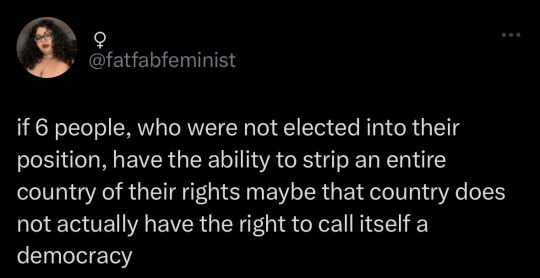
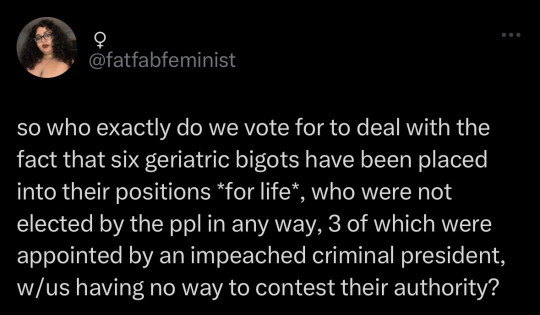

Source
#politics#us politics#scotus#Supreme Court#capitalism#government#the left#current events#news#corruption#democracy
12K notes
·
View notes
Text
things that seemed reoccurring this update:
- Meat
- peas
- jelly
- Hibernation
- Eddie's absence
- Acting out a script (Sally mumbling asking if it's her cue and Howdy changing the script of the narrator in Homewarming storybook, characters general interactions with the narrator, different moments in the video, like the Sally and Frank ad break or the song a barely silent night, where the two literally fight over who get to sing, Sally mentions she wrote the lyrics, and Frank says she already has a song. yeah all of these are easy to see as meta goofs in the original material, but it's the fact there's so much of it this update) (of course all this wrap up with the end of the video where Eddie and Frank are obviously acting off script)
- Being alone (Eddie not having any news of anyone and not even seeing anyone outside (which is interesting as the story says that Sally was up in a tree near his home and saw him fret over having nothing to do), Wally saying it's so quiet during Homewarming and it's just he and Home for a while (potentially the show putting out a christmas special and then being on break? can a show do that?), and in the normal website material, the end of "An ode to hibernation", Frank saying "Where all that's left is me", the "me" being a "...me?")
- Welcome Home being used to sell stuff (cigarettes, medicine, eggnog, cereals, and the cookbook lists ingredients that are a specific brand)
(I'm putting under read more my rambling thoughts so you can just reblog the list without having to see them)
so I can't really make sense yet of all the food stuff. Maybe there are cultural elements/expressions I don't know that explains it? But I still find it very interesting how fucking unhinged that cookbook is yet the commercial and the website treat it normally. The cookbook is overall extremely interesting, because some of the recipes seem to actually be written by the characters; Barnaby who only presents you weird hot dog dressings with pictures but no recipe (and all jokes), Frank who lists not just the ingredients but also the material, and overexplain each steps (at least overexplain compared to the other recipes. it's actually interesting to know why you do x or y), and Julie who turns her recipe into a game at the end, and felt a bit harder to follow? anyway.
The cookbook, the Homewarming tradition of hanging a ham in the tree, Santy Claus being said sometimes instead of Santa, the ham for Santa? Once again, the christmas commercials being so casual about some of the weird stuff it says and presents? This almost feels like an alien who only has a blurry grasp of Christmas and what humans enjoy made the cookbook and the live commercial.
Sometimes, Welcome Home feels like it never actually aired and produced things, but we're making it retroactively exist. Something is making it exist. Like a retcon of the universe, "What do you mean you never heard of Welcome Home? No, of course it always existed and was very popular, look at all this old material we find!"
So maybe whatever is making it exist doesn't fully get humans and accidentally creates things that are weird to prove its existence. Like a cookbook that tells you a single pea in a buttered plate is a classic meal, or that of course you give Santa ham on Homewarming! (tbh almost getting an AI weirdness feel)
But in total contrary, in its story, Welcome Home also feels like it always existed, but got somehow completely wiped from people's mind, as something caused its sudden stop, and its characters gained consciousness of what they are and their world. As an existential dread fell on them one after the other, slowly realizing something isn't right. As Eddie felt anxiety and nervousness over no one being there or contacting him, to then having the story acts lightheartedly about it, the narrator saying things have been solved but he doesn't feel it, and suddenly Home is staring at him.
Both "It never existed but the universe is being retcon into it existing" and "it existed but something terrible happened that erased it from peoples mind" seem plausible. If two theories contradict each other, that means there's a third one that needs to be found.
Maybe it existed. Maybe it truly was popular, but something corrupted it, leading to its disappearance. A disappearance so big it stopped to exist. And now the thing that corrupted it is trying to crawl back, make it exist again, but it's making it come back completely off.
Anyway.
Also, I think the show may have been on hold during the Holiday season, "hibernating", and the character who got some self awareness realized that something was off. They're alone because there's nothing new, so no one is there bringing life to the neighborhood.
#welcome home#anyway there is an existential nightmare going on that's for sure#also at one point writing my rambling I thought about metaphor for capitalism#the show gains succes and so there's a push to make money out of it. capitalism is corrupting it until it goes in shambles.#now a few decades later banking on nostalgia to make profit is what big things do#bringing back the thing from your childhood to show it again but it's off because what brought it back is not love for the thing#it's being brought back because of capitalism. the thing that corrupted it in the first place is trying to bring it back.#sorry i still ramble in the tags :x
226 notes
·
View notes
Text
▶️ Pro-Palestine protesters rally on the Democratic National Convention final day in Chicago
#▶️ Pro-Palestine protesters rally on the Democratic National Convention final day in Chicago#videos#video#palestine#gaza#rafah#free palestine#freepalastine🇵🇸#dnc 2024#dnc convention#dnc protests#dnc#ausgov#politas#auspol#tasgov#taspol#australia#fuck neoliberals#neoliberal capitalism#anthony albanese#albanese government#democratic national convention#democratic party#democrats are corrupt#democrats will destroy america#democrats#save palestine#palestinian genocide#i stand with palestine
615 notes
·
View notes
Text
Boss politics antitrust
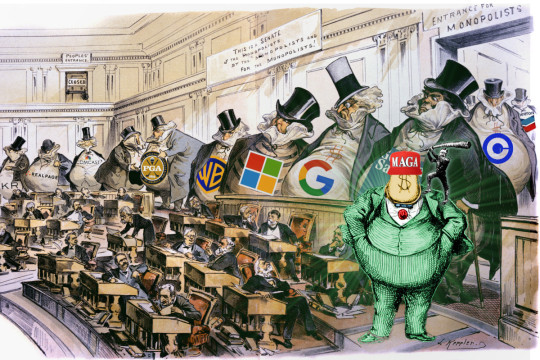
If you'd like an essay-formatted version of this post to read or share, here's a link to it on pluralistic.net, my surveillance-free, ad-free, tracker-free blog:
https://pluralistic.net/2024/11/12/the-enemy-of-your-enemy/#is-your-enemy

Xi Jinping inaugurated his second term with an anti-corruption purge that ran from 2012-2015, resulting in a massive turnover in the power structures of Chinese society.
At the time, people inside and outside of China believed that Xi was using the crackdown to target his political enemies and consolidate power. Certainly, that was the effect of the purge, which paved the way for reforms to Chinese law that have effectively allowed Xi to hold office for life.
In 2018, Peter Lorentzen (USF Econ) and Xi Lu (NUS Policy) published a paper that used clever empirical methods to get to the bottom of this question:
https://web.archive.org/web/20181222163946/https://peterlorentzen.com/wp-content/uploads/2018/11/Lorentzen-Lu-Crackdown-Nov-2018-Posted-Version.pdf
Working from the extensive data-files published during the corruption trials of the purged officials, Lorentzen and Xi Liu were able to estimate the likelihood that an official had really been corrupt. They concluded that overwhelmingly, the anti-corruption purges did target corrupt officials, some of them very highly placed.
But when they considered the social graph of those defenestrated officials, they found that they came from blocs that were rivals of Xi Jinping and his circle, while officials who were loyal to Xi Jinping's were spared, even when they were corrupt.
In other words, Xi Jinping's anticorruption efforts targeted genuinely corrupt officials – but only if they supported Xi's rivals. Xi's own cronies were exempted from this. Xi did use the anticorruption effort to consolidate power, but that doesn't mean he prosecuted the innocent – rather, he selectively prosecuted the guilty.
Donald Trump will be America's next president. He campaigned against "elites" and won the support of Americans who were rightly furious at being ripped off and abused by big business. The Biden administration had done much to tackle this corruption, starting with July 2020's 72-point executive order creating a "whole of government" approach to fighting corporate power:
https://www.eff.org/de/deeplinks/2021/08/party-its-1979-og-antitrust-back-baby
Trump will have to decide what to do about these efforts. It's easy to say that Trump will just kill them all and let giant, predatory corporations rip, but I think that's wrong. After all, the Google antitrust case that the DoJ just won started under the last Trump administration. Trump also sued to block the absolutely terrible merger between Warner and AT&T.
I think it's safer to say that Trump will selectively target businesses for anticorruption enforcement – including antitrust – based on whether they oppose him or suck up to him. I think American business leaders know it, too, which is why every tech boss lined up to give Trump a public rim-job last week:
https://daringfireball.net/2024/11/i_wonder
Trump killed the AT&T-Time Warner merger to punish CNN. He went after Google to punish "woke" tech firms. That doesn't make AT&T, Time Warner or Google good. They're terrible monopolists and the US government should be making their lives miserable.
Trump will not need to falsify evidence against corporations that are disloyal to him. All of America's big businesses are cesspits of sleaze, fraud and predation. Every merger that is being teed up now for the coming four years is illegal under the antitrust laws that we stopped enforcing in the Reagan era and only dusted off again for four years under Biden. They're all guilty, which means that Trump will be able to bring a valid case against any of them.
This will create a trap for people who hate Trump but don't pay close attention to anticorruption cases. It's a trap that Trump sprung successfully in his first term, when he lashed out at the "intelligence community" – the brutal, corrupt, vicious, lawless American spy agencies that are the sworn enemies of working people and the the struggle for justice at home and abroad – and American liberals decided that the enemy of their enemy was their friend, and energetically sold one another Robert Mueller votive candles:
https://pluralistic.net/2021/12/18/schizmogenesis/
Over the next four years, Trump will use antitrust and other corruption-taming regulations to selective punish crooked companies. He won't target them because they're crooked: he'll target them because they aren't sufficiently loyal to him.
If you let your hatred of Trump blind you to the crookedness of these companies, you lose and Trump wins. The reason Trump will find it easy to punish these companies is that they are all guilty. If you let yourself forget that, if you treat your enemy's enemy as your friend, then Trump will point at his political rivals and call them apologists for corruption and sleaze – and he'll be right.
It is possible for Trump to fight corruption corruptly. That's exactly what he'll do. But just because Trump hates these companies, it doesn't follow that we should love them.
#pluralistic#antitrust#anticorruption#schismogenesis#corruption#monopolies#boss politics#trump#trumpism#corporatism#guillotine watch#late stage capitalism#terminal stage capitalism
346 notes
·
View notes